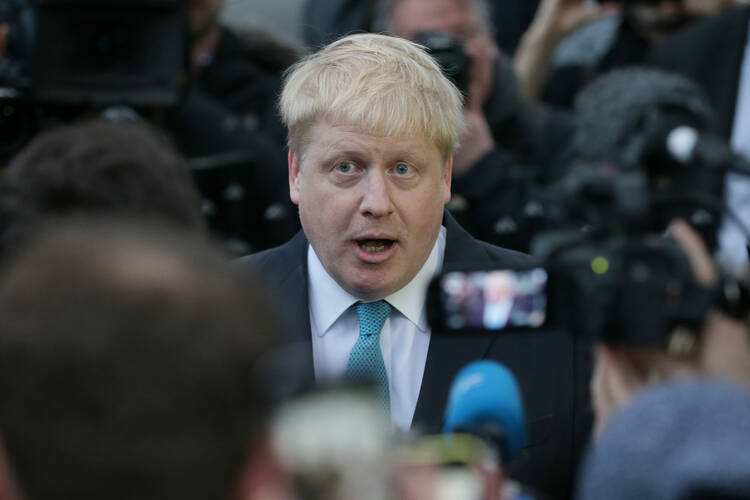Behind the black, iron, forbidding “Thatcher Gates” at one end of Downing Street, this February’s cold and drizzly gloom made the big TV lights appear even brighter, glossy in the grey puddles, as your correspondent drove along damp Whitehall this afternoon. Prime Minister David Cameron’s announcement, that he had secured a deal in Brussels, allowing him to announce a Euro-referendum date, had come and gone. Shivery-looking TV news crews stamped their feet and looked rather glum, clearly thinking of many more pleasurable ways of spending a Saturday afternoon than tightening their woolly scarves and waiting to see if anything else would be announced at the door of Number Ten.
It took Cameron a day longer than he’d hoped and perhaps a few days less than some had predicted, but the deal was done at last. There will be a referendum on British membership of the European Union on June 23rd. The Tory Government, although not all of them, will put before the voters a platform for staying in, arguing that the reforms just negotiated are good enough for us to consider remaining. The official view is to argue for remaining in the reformed and restructured E.U. The line is that here is an agreement that gives Britain a special place in Europe and therefore that people can vote to stay without worrying about any of the concerns that have been in the air since the 1970s. Britain now has a specific opt-out from the troublesome “ever-closer union” that was at the heart of the E.U. project; also, it will never join the Euro single currency.
But after Saturday morning’s Cabinet meeting, the P.M. had to agree that collective cabinet responsibility had ended, unshackling so far six of his closest colleagues to beg to differ with him. The E.U. referendum campaign thus begins immediately and at least six senior members of the governing party will campaign for a “Leave” vote. Pictures appeared quickly, showing the six already at the new Vote Leave offices, the main Brexit campaign grouping. How this will affect the Tory party, regardless of the referendum’s outcome, suddenly becomes one of the more intriguing aspects of this drama.
At least two aspects of this development, neither prominent in most media reportage, stood out. One is the lengths the other 27 E.U. leaders had gone to try to find a deal that would suit British exceptionalism and stand at least a chance of appealing to the electorate. Europe’s other leaders clearly didn’t want us to go. One might cynically point out that the European Union barely holds together as it is and that there are incipient exceptionalisms all over Europe; for Britain to vote to leave might encourage similar campaigns elsewhere and give them a greater chance of success.
The second dimension is how little was said about poverty in many parts of Europe, including here in Britain. The refugees whose suffering continues even as they reach Europe, barely got a mention. The French Government has just announced plans to evict many of the refugees from the infamous “Jungle” camp near Calais and to demolish its makeshift buildings and shelters. The U.K. Prime Minister, claiming an apparent triumph in the matter of eligibility for state benefits for inward migrants, took a little-noticed swipe at the poor by claiming that he’d brought about “an end to something-for-nothing culture,” despite that there is little evidence that inward migrants come to Britain only to claim benefits. Those targeted in this statement were migrants from the poorer eastern part of the E.U. but such words are of a piece with this Tory Government’s snarling disregard for Europe’s refugees and of their general policy of attacking the poor, scapegoating them for the nation’s woes.
Scottish Nationalists reacted with fury. In May, a general election is due north of the border. The S.N.P. claim that the timing of a U.K. national referendum on such an important constitutional matter (we do constitution rather differently over here) just before an Edinburgh election is “insulting.”
Labour’s Jeremy Corbyn noted that the deal had probably more to do with holding the Tory Party together than securing a brilliant new deal for Britain. There is by no means a clear lead in these early days for either camp, the stayers or the goers.








